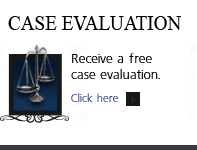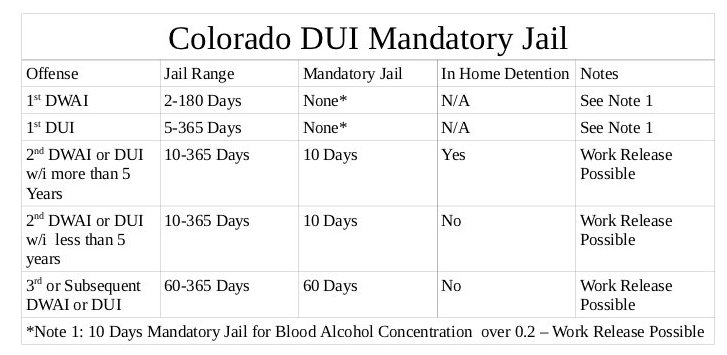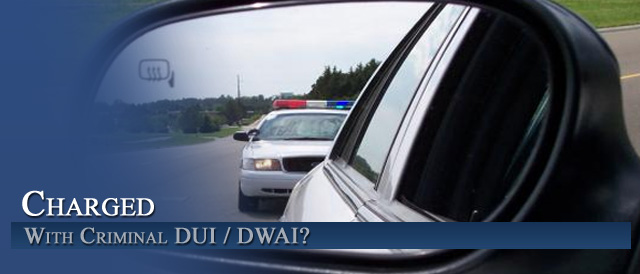


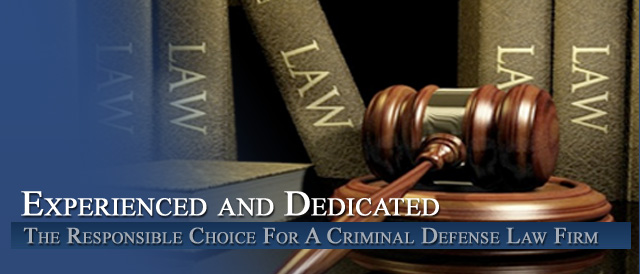
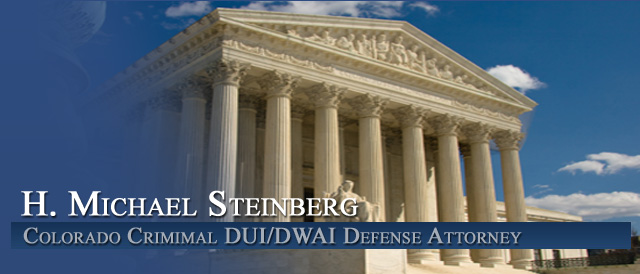
To Understand Colorado DUI – DWAI – DUID Probation Sentencing – First Read The Law
By H. Michael Steinberg Colorado DUI Probation Violation Criminal Defense Lawyer – Attorney
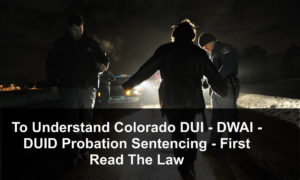 To Understand Colorado DUI – DWAI – DUID Probation Sentencing – First Read The Law – Understanding the complexities of a probation sentence in a Colorado DUI case means looking at the specifics laid out in the law and then applying those options to your case.
To Understand Colorado DUI – DWAI – DUID Probation Sentencing – First Read The Law – Understanding the complexities of a probation sentence in a Colorado DUI case means looking at the specifics laid out in the law and then applying those options to your case.
This article analyzes and provides a fairly comprehensive review of most of the relevant sections of Colorado’s DUI sentencing law – especially Section 42-4-1307 (7)-(14) Penalties for Traffic Offenses Involving Alcohol and Drugs.
I believe will assist the person facing a sentence to probation in a Colorado DUI case with the language in the law that gives a Judge the power and authority to impose what often can be a multi-layered sentence – with conditions of probation required by law and authorized by law.
First, Do Not Confuse Post-Conviction Probation After Sentencing With Pre-Conviction Monitoring By The Pre-Trial Services
There are two types of “probation like” supervision in Colorado DUI cases – Pre-Trial Services and Probation. They are often confused. But they are very different.
The goal of a “pretrial release” – or “pretrial services“ program is to reduce jail overcrowding. The program helps Colorado Judges decide who will remain in jail before their court appearances and who, with specific “conditions” can be trusted to be released to show up for their court appearances.
A “pretrial release program” provides Judge’s with pre-trial reports to help those Judges make informed decisions on setting bond, and then supervises Defendants who are released with their specific “conditions of bond.”
Colorado Defendants are ordered by Colorado Judges to follows the “conditions of their release.”
The most commons conditions of release in Colorado are:
- Compliance with the Mandatory Protection Order
- Abstinence from Alcohol/illicit Drug Use, No Possession or Use of Firearms
- Telephone Contacts
- Office Visits
- GPS Monitoring (mostly domestic violence and serious felonies)
- Home Site Checks (rare)
- Mental Health Evaluations (rare)
- Monitored Abstinence/toxicology Testing
How Long Will I Have To Follow These “Probation-Like” Pre-Trial Requirements?
In most Colorado cases, such as DUI cases, pre-trial DUI supervision, continues until the case is resolved, – usually 2 to 8 months from the filing of charges. Misdemeanors take less time – Felonies take more time.
Quick Note: The New Bail Bond Practices – A Paradigm Shift
A new approach to releasing people charged with crimes in Colorado is explained as follows. The new law compels Judges to:
“. . . consider all methods of bond and conditions of release to avoid unnecessary pretrial incarceration and levels of community-based supervision as conditions of pretrial release.”
The new law:
“…elevates avoiding unnecessary pretrial incarceration to a foundational consideration at bail; the previous statute only made passing reference to the notion as a function of pretrial services programs.
Is explained as follows:
“In the field of pretrial justice, unnecessary pretrial detention is epitomized by incarcerating defendants, typically through the use of secured financial conditions, when other less restrictive conditions or combinations of conditions would suffice to manage those defendants in the community.”
Colorado’s New Approach To Setting Bond and Conditions Of Bond – Section 16-4-103 – Requires:
(1) the court to determine the type of bond and conditions of release;
(2) review of any bond and conditions fixed upon return of an indictment or filing of the information or complaint (including on warrants issued after the filing of charging documents);
(3) a presumption of release under least-restrictive conditions unless the defendant is un-bailable pursuant to the Constitutional preventive detention provisions;
(4) individualization of conditions of release (including in “bond schedules”) and express mandatory consideration of a defendant’s financial condition or situation;
(5) “reasonable” financial conditions, and non-statutory conditions to be “tailored to address a specific concern;” and
(6) consideration of ways (including changing bond types) to avoid unnecessary pretrial detention.
Probation – Post Conviction – Based Sentences In Colorado DUI
Colorado’s DUI Sentencing law is long and complex but can be broken down into at least TWO major components.
For simplicity, in reverse order, I would describe “Part II” covering Sections (7) to the end of the law – Section (14)- as the Conditions of Probation.
Part I, Sections (1) to Section (6), could be called the Range of Possible Penalties and describes the major mandatory and other possible penalties for one or more Colorado DUI – DWAI – DUID convictions. It also includes a definition of important words and phrases used in the law.
The following chart summarizes Part I:
PART I – The Range of Possible Penalties
§ 42-4-1307. Penalties for Traffic Offenses Involving Alcohol and Drugs
(1) Legislative declaration. The general assembly hereby finds and declares that, for the purposes of sentencing as described in section 18-1-102.5, C.R.S ., each sentence for a conviction of a violation of section 42-4-1301 shall include:
(a) A period of imprisonment, which, for a repeat offender, shall include a mandatory minimum period of imprisonment and restrictions on where and how the sentence may be served; and
(2) Definitions. As used in this section, unless the context otherwise requires:
(a) “Approved ignition interlock device” has the same meaning as set forth in section 42-2-132.5
(b) “Conviction” means a verdict of guilty by a judge or jury or a plea of guilty or nolo contendere that is accepted by the court for an offense or adjudication for an offense that would constitute a criminal offense if committed by an adult. “Conviction” also includes having received a deferred judgment and sentence or deferred adjudication; except that a person shall not be deemed to have been convicted if the person has successfully completed a deferred sentence or deferred adjudication.
(c) “Driving under the influence” or “DUI” means driving a motor vehicle or vehicle when a person has consumed alcohol or one or more drugs, or a combination of alcohol and one or more drugs, that affects the person to a degree that the person is substantially incapable, either mentally or physically, or both mentally and physically, of exercising clear judgment, sufficient physical control, or due care in the safe operation of a vehicle.
(d) “Driving while ability impaired” or “DWAI” means driving a motor vehicle or vehicle when a person has consumed alcohol or one or more drugs, or a combination of both alcohol and one or more drugs, that affects the person to the slightest degree so that the person is less able than the person ordinarily would have been, either mentally or physically, or both mentally and physically, to exercise clear judgment, sufficient physical control, or due care in the safe operation of a vehicle.
(e) “UDD” shall have the same meaning as provided in section 42-1-102(109.7) .
(3) First offenses–DUI and DUI per se. (a) Except as otherwise provided in subsections (5) and (6) of this section, a person who is convicted of DUI or DUI per se shall be punished by:
(I) Imprisonment in the county jail for at least five days but no more than one year, the minimum period of which shall be mandatory; except that the court may suspend the mandatory minimum period if, as a condition of the suspended sentence, the offender undergoes a presentence or postsentence alcohol and drug evaluation and satisfactorily completes and meets all financial obligations of a level I or level II program as is determined to be appropriate by the alcohol and drug evaluation that is required pursuant to section 42-4-1301.3;
(II) A fine of at least six hundred dollars but no more than one thousand dollars, and the court shall have discretion to suspend the fine; and
(III) At least forty-eight hours but no more than ninety-six hours of useful public service, and the court shall not have discretion to suspend the mandatory minimum period of performance of such service.
(b) Notwithstanding the provisions of subparagraph (I) of paragraph (a) of this subsection (3), and except as described in paragraphs (a) and (b) of subsection (5) and paragraph (a) of subsection (6) of this section, a person who is convicted of DUI or DUI per se when the person’s BAC was 0.20 or more at the time of driving or within two hours after driving shall be punished by imprisonment in the county jail for at least ten days but not more than one year; except that the court shall have the discretion to employ the sentencing alternatives described in section 18-1.3-106, C.R.S .
(c) In addition to any penalty described in paragraph (a) of this subsection (3), the court may impose a period of probation that shall not exceed two years, which probation may include any conditions permitted by law.
(4) First offenses–DWAI. (a) Except as otherwise provided in subsections (5) and (6) of this section, a person who is convicted of DWAI shall be punished by:
(I) Imprisonment in the county jail for at least two days but no more than one hundred eighty days, the minimum period of which shall be mandatory; except that the court may suspend the mandatory minimum period if, as a condition of the suspended sentence, the offender undergoes a presentence or postsentence alcohol and drug evaluation and satisfactorily completes and meets all financial obligations of a level I or level II program as is determined to be appropriate by the alcohol and drug evaluation that is required pursuant to section 42-4-1301.3 ; and
(II) A fine of at least two hundred dollars but no more than five hundred dollars, and the court shall have discretion to suspend the fine; and
(III) At least twenty-four hours but no more than forty-eight hours of useful public service, and the court shall not have discretion to suspend the mandatory minimum period of performance of such service.
(b) Notwithstanding the provisions of subparagraph (I) of paragraph (a) of this subsection (4), and except as described in paragraphs (a) and (b) of subsection (5) and paragraph (a) of subsection (6) of this section, a person who is convicted of DWAI when the person’s BAC was 0.20 or more at the time of driving or within two hours after driving shall be punished by imprisonment in the county jail for at least ten days but not more than one year; except that the court shall have the discretion to employ the sentencing alternatives described in section 18-1.3-106, C.R.S .
(c) In addition to any penalty described in paragraph (a) of this subsection (4), the court may impose a period of probation that shall not exceed two years, which probation may include any conditions permitted by law.
(5) Second offenses. (a) Except as otherwise provided in subsection (6) of this section, a person who is convicted of DUI, DUI per se, or DWAI who, at the time of sentencing, has a prior conviction of DUI, DUI per se, DWAI, vehicular homicide pursuant to section 18-3-106(1)(b), C.R.S ., vehicular assault pursuant to section 18-3-205(1)(b), C.R.S ., aggravated driving with a revoked license pursuant to section 42-2-206(1)(b)(I)(A) or (1)(b)(I)(B) , as that crime existed before August 5, 2015, or driving while the person’s driver’s license was under restraint pursuant to section 42-2-138(1)(d) , shall be punished by:
(I) Imprisonment in the county jail for at least ten consecutive days but no more than one year; except that the court shall have discretion to employ the sentencing alternatives described in section 18-1.3-106, C.R.S . During the mandatory ten-day period of imprisonment, the person shall not be eligible for earned time or good time pursuant to section 17-26-109, C.R.S ., or for trusty prisoner status pursuant to section 17-26-115, C.R.S .; except that the person shall receive credit for any time that he or she served in custody for the violation prior to his or her conviction.
(II) A fine of at least six hundred dollars but no more than one thousand five hundred dollars, and the court shall have discretion to suspend the fine;
(III) At least forty-eight hours but no more than one hundred twenty hours of useful public service, and the court shall not have discretion to suspend the mandatory minimum period of performance of the service; and
(IV) A period of probation of at least two years, which period shall begin immediately upon the commencement of any part of the sentence that is imposed upon the person pursuant to this section, and a suspended sentence of imprisonment in the county jail for one year, as described in subsection (7) of this section; except that the court shall not sentence the defendant to probation if the defendant is sentenced to the department of corrections but shall still sentence the defendant to the provisions of paragraph (b)of subsection (7) of this section. The defendant shall complete all court-ordered programs pursuant to paragraph (b) of subsection (7) of this section before the completion of his or her period of parole.
(b) If a person is convicted of DUI, DUI per se, or DWAI and the violation occurred less than five years after the date of a previous violation for which the person was convicted of DUI, DUI per se, DWAI, vehicular homicide pursuant to section 18-3-106(1)(b), C.R.S ., vehicular assault pursuant to section 18-3-205(1)(b), C.R.S ., aggravated driving with a revoked license pursuant to section 42-2-206(1)(b)(I)(A) or (1)(b)(I)(B) , as that crime existed before August 5, 2015, or driving while the person’s driver’s license was under restraint pursuant to section 42-2-138(1)(d) , the court does not have discretion to employ any sentencing alternatives described in section 18-1.3-106, C.R.S ., during the minimum period of imprisonment described in subparagraph (I) of paragraph (a) of this subsection (5); except that a court may allow the person to participate in a program pursuant to section 18-1.3-106(1)(a)(II) , (1)(a)(IV) , or (1)(a)(V), C.R.S ., only if the program is available through the county in which the person is imprisoned and only for the purpose of:
(I) Continuing a position of employment that the person held at the time of sentencing for said violation;
(II) Continuing attendance at an educational institution at which the person was enrolled at the time of sentencing for said violation; or
(III) Participating in a court-ordered level II alcohol and drug driving safety education or treatment program, as described in section 42-4-1301.3(3)(c)(IV) .
(c) Notwithstanding the provisions of section 18-1.3-106(12), C.R.S ., if, pursuant to paragraph (a) or (b) of this subsection (5), a court allows a person to participate in a program pursuant to section 18-1.3-106, C.R.S ., the person shall not receive one day credit against his or her sentence for each day spent in such a program, as provided in said section 18-1.3-106(12), C.R.S .
(6) Third and subsequent offenses. (a) Except as provided in section 42-4-1301(1)(a) , (1)(b) , and (2)(a) , a person who is convicted of DUI, DUI per se, or DWAI who, at the time of sentencing, has two or more prior convictions of DUI, DUI per se, DWAI, vehicular homicide pursuant to section 18-3-106(1)(b), C.R.S ., vehicular assault pursuant to section 18-3-205(1)(b), C.R.S ., aggravated driving with a revoked license pursuant to section 42-2-206(1)(b)(I)(A) or (1)(b)(I)(B) , as that crime existed before August 5, 2015, or driving while the person’s driver’s license was under restraint pursuant to section 42-2-138(1)(d) shall be punished by:
(I) Imprisonment in the county jail for at least sixty consecutive days but no more than one year. During the mandatory sixty-day period of imprisonment, the person shall not be eligible for earned time or good time pursuant to section 17-26-109, C.R.S ., or for trusty prisoner status pursuant to section 17-26-115, C.R.S .; except that a person shall receive credit for any time that he or she served in custody for the violation prior to his or her conviction. During the mandatory period of imprisonment, the court shall not have any discretion to employ any sentencing alternatives described in section 18-1.3-106, C.R.S .; except that the person may participate in a program pursuant to section 18-1.3-106(1)(a)(II) , (1)(a)(IV) , or (1)(a)(V), C.R.S ., only if the program is available through the county in which the person is imprisoned and only for the purpose of:
(A) Continuing a position of employment that the person held at the time of sentencing for said violation;
(B) Continuing attendance at an educational institution at which the person was enrolled at the time of sentencing for said violation; or
(C) Participating in a court-ordered level II alcohol and drug driving safety education or treatment program, as described in section 42-4-1301.3(3)(c)(IV) ;
(II) A fine of at least six hundred dollars but no more than one thousand five hundred dollars, and the court shall have discretion to suspend the fine;
(III) At least forty-eight hours but no more than one hundred twenty hours of useful public service, and the court shall not have discretion to suspend the mandatory minimum period of performance of the service; and
(IV) A period of probation of at least two years, which period shall begin immediately upon the commencement of any part of the sentence that is imposed upon the person pursuant to this section, and a suspended sentence of imprisonment in the county jail for one year, as described in subsection (7) of this section; except that the court shall not sentence the defendant to probation if the defendant is sentenced to the department of corrections, but shall still sentence the defendant to the provisions of paragraph (b) of subsection (7) of this section. The defendant shall complete all court-ordered programs pursuant to paragraph (b) of subsection (7) of this section before the completion of his or her period of parole.
(b) Notwithstanding the provisions of section 18-1.3-106(12), C.R.S ., if, pursuant to paragraph (a) of this subsection (6), a court allows a person to participate in a program pursuant to section 18-1.3-106(1)(a)(II) , (1)(a)(IV) , or (1)(a)(V), C.R.S ., the person shall not receive one day credit against his or her sentence for each day spent in such a program, as provided in said section 18-1.3-106(12), C.R.S .
(c) Notwithstanding any other provision of law, if the defendant satisfies the conditions described in subparagraphs (I) and (II) of this paragraph (c), the court may include as a condition of probation a requirement that the defendant participate in alcohol treatment. If the defendant’s assessed treatment need is for residential treatment, the court may make residential alcohol treatment a condition of probation and may place the offender in a community corrections program that can provide the appropriate level of treatment. This paragraph (c) applies only if:
(I) At the time of sentencing, the person has two prior convictions of DUI, DUI per se, DWAI, vehicular homicide pursuant to section 18-3-106(1)(b), C.R.S ., or vehicular assault pursuant to section 18-3-205(1)(b), C.R.S .; and
(II) The first of the person’s two prior convictions was based on a violation that occurred not more than seven years before the violation for which the person is being sentenced.
PART II – Conditions Of DUI Probation
[HMS – The following sections address the conditions of DUI probation beyond the penalties outlined above.]
(7) Probation-related penalties. When a person is sentenced to a period of probation pursuant to subparagraph (IV) of paragraph (a) of subsection (5) of this section or subparagraph (IV) of paragraph (a) of subsection (6) of this section:
(b) The court:
During the period of imprisonment, the person shall continue serving the probation sentence with no reduction in time for the sentence to probation. A cumulative period of imprisonment imposed pursuant to this paragraph (c) shall not exceed one year.
(I) The person has successfully completed a level II alcohol and drug driving safety education or treatment program pursuant to subparagraph (I) of paragraph (b) of this subsection (7);
(II) The person has otherwise complied with the terms and conditions of his or her probation; and
(III) Early termination of the period of probation will not endanger public safety.
(9) Previous Convictions.
(a) For the purposes of subsections (5) and (6) of this section, a person is deemed to have a previous conviction for DUI, DUI per se, DWAI, vehicular homicide pursuant to section 18-3-106(1) (b), C.R.S., vehicular assault pursuant to section 18-3-205(1) (b), C.R.S., aggravated driving with a revoked license pursuant to section 42-2-206(1) (b) (I) (A) or (1) (b) (I) (B), as that crime existed before the effective date of House Bill 15-1043, as enacted in 2015, or driving while the person’s driver’s license was under restraint pursuant to section 42-2-138(1) (d), if the person has been convicted under the laws of this state or under the laws of any other state, the United States, or any territory subject to the jurisdiction of the United States, of an act that, if committed within this state, would constitute the offense of DUI, DUI per se, DWAI, vehicular homicide pursuant to section 18-3- 106(1) (b), C.R.S., vehicular assault pursuant to section 18-3-205(1) (b), C.R.S., aggravated driving with a revoked license pursuant to section 42-2-206(1) (b) (I) (A) or (1) (b) (I) (B), as that crime existed before the effective date of House Bill 15-1043, as enacted in 2015, or driving while the person’s driver’s license was under restraint pursuant to section 42-2-138(1) (d).
(b) (I) For sentencing purposes concerning convictions for second and subsequent offenses, prima facie proof of a person’s previous convictions shall be established when:
(A) The prosecuting attorney and the person stipulate to the existence of the prior conviction or convictions;
(B) The prosecuting attorney presents to the court a copy of the person’s driving record provided by the department of revenue or by a similar agency in another state, which record contains a reference to the previous conviction or convictions; or
(C) The prosecuting attorney presents an authenticated copy of the record of the previous conviction or judgment from a court of record of this state or from a court of any other state, the United States, or any territory subject to the jurisdiction of the United States.
(II) The court shall not proceed to immediate sentencing if the prosecuting attorney and the person have not stipulated to previous convictions or if the prosecution has requested an opportunity to obtain a driving record or a copy of a court record. The prosecuting attorney shall not be required to plead or prove any previous convictions at trial.
(10) Additional Costs and Surcharges.
In addition to the penalties prescribed in this section:
(a) Persons convicted of DUI, DUI per se, DWAI, and UDD are subject to the costs imposed by section 24-4.1-119(1) (c), C.R.S., relating to the crime victim compensation fund;
(b) Persons convicted of DUI, DUI per se, and DWAI are subject to a surcharge of at least one hundred dollars but no more than five hundred dollars to fund programs to reduce the number of persistent drunk drivers. The surcharge shall be mandatory, and the court shall not have discretion to suspend or waive the surcharge; except that the court may suspend or waive the surcharge if the court determines that a person is indigent. Moneys collected for the surcharge shall be transmitted to the state treasurer, who shall credit the amount collected to the persistent drunk driver cash fund created in section 42-3-303.
(c) Persons convicted of DUI, DUI per se, DWAI, and UDD are subject to a surcharge of twenty dollars to be transmitted to the state treasurer who shall deposit moneys collected for the surcharge in the Colorado traumatic brain injury trust fund created pursuant to section 26-1-309, C.R.S.;
(d) (I) Persons convicted of DUI, DUI per se, and DWAI are subject to a surcharge of at least one dollar but no more than ten dollars for programs to fund efforts to address alcohol and substance abuse problems among persons in rural areas. The surcharge shall be mandatory, and the court shall not have discretion to suspend or waive the surcharge; except that the court may suspend or waive the surcharge if the court determines that a person is indigent. Any moneys collected for the surcharge shall be transmitted to the state treasurer, who shall credit the same to the rural alcohol and substance abuse cash fund created in section 27-80-117(3), C.R.S.
(II) This paragraph (d) is repealed, effective July 1, 2016, unless the general assembly extends the repeal of the rural alcohol and substance abuse prevention and treatment program created in section 27-80-117, C.R.S.
(14) Public service penalty. In addition to any other penalties prescribed in this part 13, the court shall assess an amount, not to exceed one hundred twenty dollars, upon a person required to perform useful public service.
Summary And Conclusion – To Understand Colorado DUI – DWAI – DUID Probation Sentencing – First Read The Law
In Colorado if you are arrested for and later convicted of a DUI, most likely you will be placed on probation with numerous conditions. Understanding the options a Colorado Judge has will help you to make certain you can, and will comply with the terms of that probationary sentence.
By studying the law, you will come to understand the limitations the law places on Judges and how the law encourages a Colorado Judge to make probation work for you. Additionally, you will understand what punishment you may face if you decide, or simply cannot, comply with the terms and conditions of your probation.
To Understand Colorado DUI – DWAI – DUID Probation Sentencing – First Read The Law
If you found any of the information I have provided on this web page article helpful please click my Plus+1 or the Share buttons for Twitter and Facebook below so that others may also find it.
The reader is admonished that Colorado criminal law, like criminal law in every state and at the Federal level, changes constantly. The article appearing above was accurate at the time it was drafted but it cannot account for changes occurring after it was uploaded.
If, after reading this article, you have questions about your case and would like to consider retaining our law firm, we invite you to contact us at the Steinberg Colorado Criminal Defense Law Firm – 303-627-7777.
Never stop fighting – never stop believing in yourself and your right to due process of law. You will not be alone in court, H. Michael will be at your side every step of the way – advocating for justice and the best possible result in your case. H. Michael Steinberg is passionate about criminal defense. His extensive knowledge and experience of Colorado Criminal Law gives him the edge you need to properly handle your case
 ABOUT THE AUTHOR: H. Michael Steinberg – Email The Author at:
ABOUT THE AUTHOR: H. Michael Steinberg – Email The Author at:
A Denver Colorado Criminal Defense Lawyer – or call his office at 303-627-7777 during business hours – or call his cell if you cannot wait and need his immediate assistance – please call 720-220-2277.
“A good criminal defense lawyer is someone who devotes themselves to their client’s case from beginning to end, always realizing that this case is the most important thing in that client’s life.”
You should be careful to make a responsible choice in selecting a Colorado Criminal Defense Lawyer. We encourage you to “vet” our firm. Over the last 40 plus years – by focusing ONLY on Colorado criminal law – H. Michael has had the necessary time to commit to the task of constantly updating himself on nearly every area of criminal law, to include Colorado criminal law and procedure and trial and courtroom practice.
Putting more than 40 years of Colorado criminal defense experience to work for you.
H. Michael works hard to get his clients the best possible results in and out of the courtroom. He has written, and continues to write, extensively on Colorado criminal law and he hopes this article helps you in some small way – To Understand Colorado DUI – DWAI – DUID Probation Sentencing – First Read The Law.
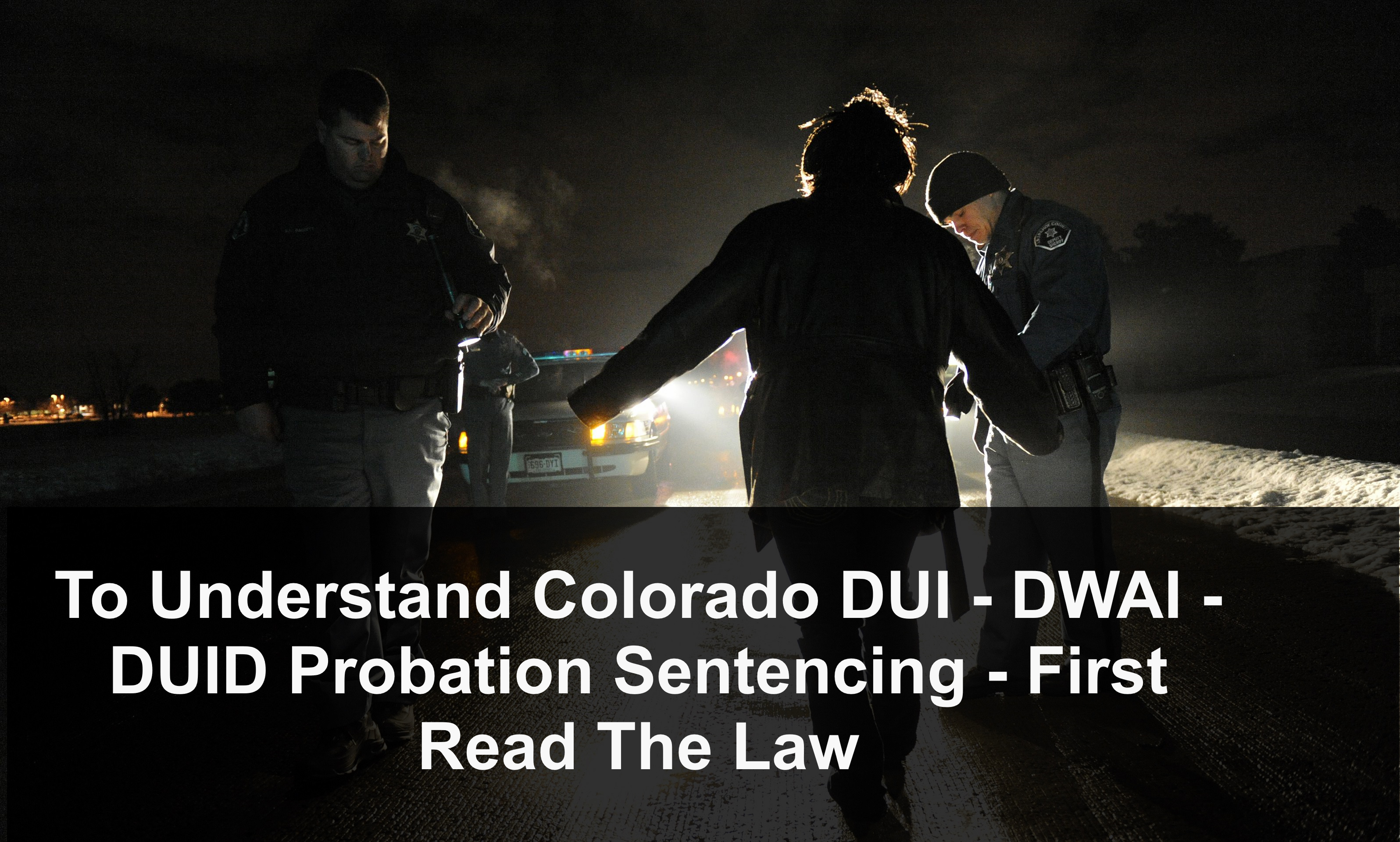
Other Articles of Interest:
- Violations of DUI – DWAI – Probation In Colorado
- After The DUI -DWAI – DUID – Colorado Alcohol Based Driving Convictions For Driving Under Revocation, Denial And Restraint 42-2-138
- The Colorado DUI -DWAI Field SobrietyTests
- Sentencing In A Colorado DUI – DWAI – DUID Case – “Re-packaging” The Client Ideas and Arguments
- Colorado DUI Law – DUI Probation Violations – Revocation Of Probation


